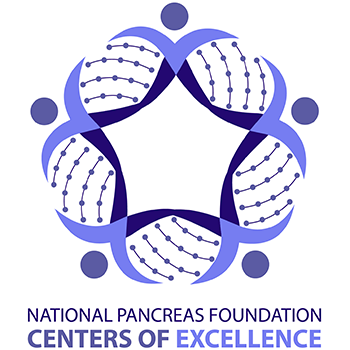
Navigating your Cancer Journey with Compassion and Expertise
Liver and pancreatic cancers are serious conditions that arise in the organs responsible for digestion and metabolism. Liver cancer typically begins in the liver cells, while pancreatic cancer originates in the tissues of the pancreas. Both types can progress rapidly and may be diagnosed at advanced stages, making early detection crucial for effective treatment.
Receiving a pancreatic or liver cancer diagnosis can be overwhelming. That’s why we’re here to support you. Our team of board-certified doctors and oncologists provides compassionate care, drawing on decades of combined experience to guide you through every step of your journey. You can trust that we are committed to your well-being and the best possible outcomes.
National Pancreas Foundation Center of Excellence
McGlinn Cancer Institute is recognized by the National Pancreas Foundation (NPF) as a Center of Excellence for the treatment of pancreatic cancer.
The NPF Center of Excellence designation is awarded after a rigorous audit that reviews an institution’s focus is on multidisciplinary treatment of pancreatic cancer. This includes treating the “whole patient” with a focus on the best possible outcomes and an improved quality of life.
An approved NPF Center must meet criteria developed by a task force comprised of invited subject matter experts and patient advocates. The criteria includes having the required expert physician specialties such as gastroenterologists, pancreas surgeons, and interventional radiologists, along with more patient focused programs such as a pain management service, psychosocial support, and more.

Pancreatic Cancer
This disease develops when cancer cells form in the pancreas. This cancer can be hard to detect because the pancreas is tucked into the abdomen, near many other organs like the stomach and liver.

Liver Cancer
The liver is the body’s largest organ and helps digest food and remove poisons. There are two main types of liver cancer: primary and metastatic. Primary liver cancer gets its name because it starts in the liver. Metastatic liver cancer starts somewhere else in the body and then spreads to the liver.
Diagnosing Pancreatic and Liver Cancers
We use advanced tools and methods to diagnose pancreatic and liver cancers.
- Barium enema. A barium-containing solution coats the lining of the esophagus, stomach, and intestines to help show abnormalities of the lining of these organs.
- Biopsy. Often, this test is the only way to be certain if a person has some type of digestive tract cancer. Cells are removed from the tumor or growth and examined in the lab.
- Endoscopic procedures. These tests use a flexible lighted tube (endoscope) that has a video camera on the end. It lets the doctor see any abnormal areas in the lining of the digestive organs clearly on a monitor. Small samples of any abnormal areas can also be biopsied through the endoscope. Different kinds of endoscopic tests may be used: including esophagogastroduodenoscopy (EGD), endoscopic ultrasound (EUS), colonoscopy and sigmoidoscopy.
- Imaging tests. Pictures are taken of the inside of your body to look for cancer, learn how far it has spread, and help see if treatment is working. Types of imagining tests include computed tomography (CT) scans, nuclear medicine scans (such as bone scans and thyroid scans) and magnetic resonance image (MRI) and positron emission tomography (PET) scans.
- Laparoscopy. Although CT or MRI scans can make detailed pictures of the inside of the body, they may miss certain tumors, especially if they’re tiny. Doctors might do a laparoscopy before any other surgery to help confirm cancer can be removed completely with surgery.
- Liver function tests. This procedure checks a blood sample to measure the amounts of certain substances released into the blood by the liver.
- Serum tumor marker test. The doctor takes a sample of blood. The sample is examined to measure the amounts of certain substances released into the blood by organs, tissues, or tumor cells in the body.

Treating Pancreatic and Liver Cancers
These cancers are most often treated with surgery and are sometimes combined with chemotherapy or radiation. Your multidisciplinary team of cancer experts will work with you to create a plan that’s based on your unique diagnosis. Treatments may include:
- Chemotherapy (chemo). This treatment can cure or help control cancer and ease its symptoms. Chemo treatments use specialized medicines to kill cancer cells. One such chemo treatment approach is hyperthermic intraperitoneal chemotherapy (HIPEC).
- Immunotherapy. Your immune system protects your body from illness and harmful foreign substances. Immunotherapy is just one of the forms of precision medicine we offer that boosts your body's immune system and helps it recognize and attack cancer cells.
- Interventional radiology (IR). This minimally invasive, image-guided technique treats cancers that only open surgery used to be able to address. These treatments include:
- Chemoembolization. This delivers cancer-killing medicine through a tube to the affected organ.
- Cryoablation. Extremely cold temperatures are used to freeze the tumor.
- Radiofrequency ablation. Transforms an electric current into heat to destroy the tumor.
- Radiation therapy. Usually used as a local treatment for these cancers, which means it targets and affects only the part of the body that needs treatment. Some of these therapies use radioactive substances that are given in a vein or by mouth and travel through the body, where it mostly collects in the area of the tumor.
Adaptive Radiation Therapy
Adaptive radiation therapy is a state-of-the-art treatment option that allows clinicians to develop a new plan during each session. As a result, radiation plans can be individually tailored and based on the internal positioning of the patient's anatomy that day. This permits potentially higher and more effective dosage to the tumor, while better sparing healthy tissues and reducing side effects. Because radiation doses can be better shaped to the tumor each day, adaptive radiation therapy can also reduce the number of total treatment sessions. This revolutionary technique can be used to treat a wide array of cancers throughout the body, particularly those in the lung, abdomen, and pelvis.
- Surgery. Treating pancreatic and liver cancers with surgery depends mainly on if the cancer can be removed completely. Many of our surgical oncologists offer laparoscopic and minimally invasive robotic procedures utilizing state-of-the-art equipment. Surgical specialists also offer Hepato-Pancreato-Biliary surgery to treat malignant and benign liver and pancreas cancer.
